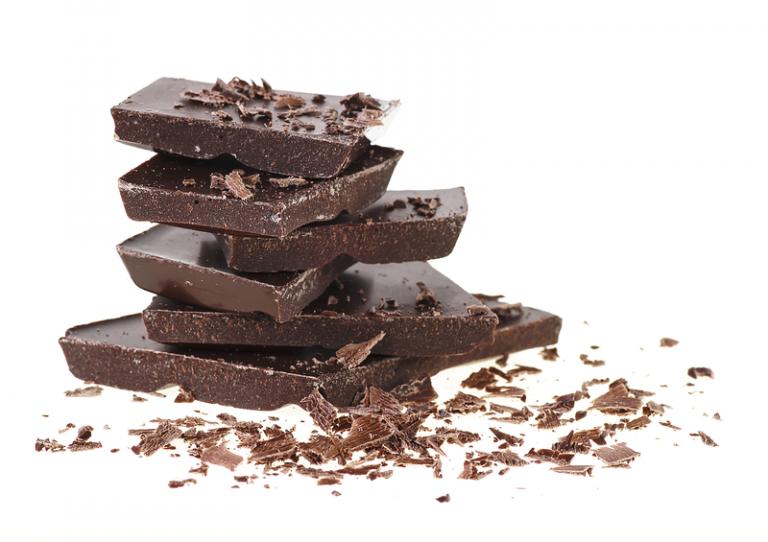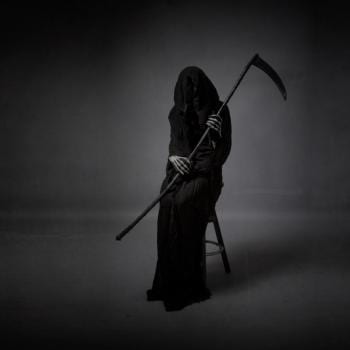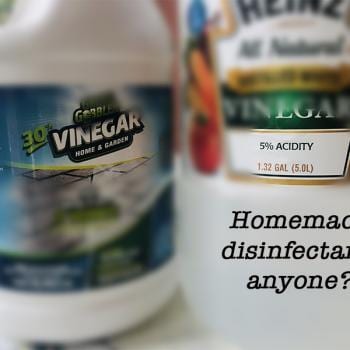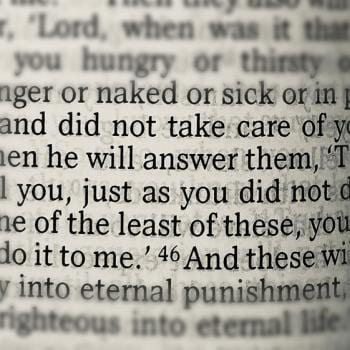In other words, with all due respect to the Star Trek enemy collective named The Borg, “Resistance is futile; You will be infected.”
Although most will be fine, we are going to lose beloved loved ones, both the elderly and our friends and relatives who are immunocompromised. We are going to see devastation among the lowest economic rungs of our society, and especially among the minority populations.
We need a theology to deal with this. Perhaps a piece of chocolate is the answer.

I ponder much these days on safety and self-isolation, on the growing numbers of infected people and the scary numbers of deaths from COVID-19, on the troubling economic messages, and the complications of just NOT KNOWING what to expect.
And yet, today’s horrors only reflect the history of human existence. Pandemics, mass starvation, and devastations of entire populations by wars, invasions, and their accompanying diseases have been with us since the earliest days of humankind.
Despite our best efforts to predict it and to make life itself predictable, less random, less scary, we never really know what may come next.
One thing we can be fairly sure of: every pandemic in known history highlights the infection and survival differences between the elite (and I know I’m one) who can safely isolate at behind solid walls, taking few financial hits, and the vast majority of those in the world who MUST have work and income because only a few days without pushes them over their already fragile, crumbling walls of “safety.”
Clearly, the current situation mirrors the past. The least among us clearly suffer the most.
Resistance is futile
The entire world, not just the US, stands now between the proverbial rock and hard spot. Any choice leaves damages that grieve the heart to consider. A collapsing economy will itself cause countless deaths which, while not technically due to Covid-19, most definitely are related to the system collapse, extreme civil unrest, and the accompanying starvation and more disease.
On the other hand, a raging pandemic turns us all into third-world countries with bodies piling up on the streets or stuffed into back rooms of nursing homes, overwhelmed hospitals, sicker and sicker medical personnel, and growing panic. Now, that’s a worst-case scenario. We are actually lucky here: SAR-Cov-2 is not overwhelmingly lethal: survival rates are extremely high.
Even so, we’re going to have to find national and international courage to face our current reality: a lot will die. Period. In countries like the US where we have lost most of our shared common values and where many will not or cannot make sacrifices for the common good, and where we lack solid, united national leadership to steer us through this, the death rate will likely be unacceptably high, more on the level of far less advanced economic societies.
Some societies are already showing they can hold together because of a greater commitment to the common good and more steady and unified leadership at the helm. They have a greater chance of being spared the higher death rates; even so, many will succumb.
 But the virus named SARS-CoV-2 will be with us forever. It’s not going to go away. At some point, nearly all of us are going to be exposed and many infected until an effective and widely used vaccine becomes available or until most of the vulnerable have been killed by it. In other words, with all due respect to the Star Trek collective named The Borg, “Resistance is futile; You will be infected.”
But the virus named SARS-CoV-2 will be with us forever. It’s not going to go away. At some point, nearly all of us are going to be exposed and many infected until an effective and widely used vaccine becomes available or until most of the vulnerable have been killed by it. In other words, with all due respect to the Star Trek collective named The Borg, “Resistance is futile; You will be infected.”
We are going to lose beloved loved ones, both the elderly and our friends and relatives who are immunocompromised. We are going to see devastation among the lowest economic rungs of our society.
Pandemics ALWAYS do that. This one is not new in its effect. But with the large numbers of people now inhabiting our planet, and too many living under conditions of raging poverty and unsanitary conditions, the numbers of deaths will shock us.
We need a theology of disease and disaster
We’re going to have to look hard at our souls and our theology and seek to discern the presence of God in the midst of all the suffering. We’re going to have to leave behind so much magical God-thinking that if we only believe rightly that God will make it all OK and will protect us. It’s not OK. The world is not OK. It is sick, vomiting with illness, and much of that illness stems from human hubris that we can do anything we want without consequences.
The time has come to develop better and more holy understandings of earth and people care. The time has come to realize that microbes will always be with us, always changing and finding ways to jump species and learn to live with them rather than deciding we can eliminate them–they always come back stronger after every attempt.
A relative wrote this question to me today:
My husband and I seem to think if we get this we are goners One of my friends says I have trust in God and if he wants to take me so be it. So she has gotten a pedicure and haircut and might be a year older than me. I feel being elderly our immune systems will not be strong enough to fight it. I know rarely there are some in their 90’s and even 100 that survive. Only God knows when it is our time. How do you feel about that? My faith is strong but I feel He wants us to do our part in staying healthy.
This question really got me thinking. First, her husband is probably right about him being a goner if he gets it—he is diabetic and that combined with his age, his sex (men have a significantly higher mortality rate) and general lack of exercise put him in a very high-risk category. But she is in a very different place. She’s vibrantly healthy and takes good care of herself.
But if she brings it home to her husband? There is the problem.
But again, I know that her current living conditions are mimicking a depressing prison, and that is not good at all for her health either. Back to the rock and hard spot.
And I have all sorts of mixed feelings about the statement, “If God wants to take you . . . ” First, it speaks so ill of God, making the Holy One a capricious evil genius, playing chess with our lives, happily snatching newborn babies away from their grieving parents, joyously releasing pandemics, floods, earthquakes, and hurricanes in order to grab several thousand (millions) more for “heaven”, directing malarial-laden mosquitos onto certain vulnerable ones in order to “take them now.”
Making sense of the nature of God in the face of disaster
That kind of God no longer makes sense to me at all.
As I read the Scriptures, it appears to me that God and humans are supposed to work in active partnership to bring about goodness and healing. If the scriptures are true about us being made “in the image of God,” that means we are immensely creative beings whose jobs are to do what God does: bring beauty, goodness, and order out of chaos.
That’s the story of our beginnings. And I stay permanently intrigued by the story in John 5 where Jesus encounters the man who has been crippled from birth, 38 years.
Jesus asks the man “do you WANT to be well?” That seems to me to be the key. Do we WANT to be well? In that case, he tells the man, “Stand up. Pick up your mat. Walk.” Think about it: the man has to take the first step to wellness by abandoning his life as a beggar and moving into the responsibility it takes to live as a well person. In other words, he has to step away from everything he has ever known to become well.
Frankly, I think it takes a lot more God-likeness to live as well people–again, responsible for our choices and intentionally treating our bodies as holy vessels, deserving of the best care–than it does to be the passively sick, “God must want this from me or God would have healed me by now.”
Anytime we take steps to health, be that mentally or spiritually or socially or emotionally, we do it in partnership with God, listening to the nudges of the Spirit.
In time, of course, all bodies wear out. Sadly, not all bodies are viable at birth. Others are born with problems that will inevitably shorten their lives. But I just don’t see the passive, “God will take me when he wants” anywhere in the Scriptures.
I think God grieves with us at untimely ends. God doesn’t want to see the military slaughtered in battles, or women and children randomly shot so “He can have another angel in heaven.” That, to me, is a bunch of b***s*** and very dangerous theology.
This pandemic, along with all most others that have devastated human history for as long as anyone as kept records, comes about by animal to human transfer, exacerbated by unsanitary conditions, made worse by political regimes that leave way, way, too many living in desperate poverty.
Three issues here: physical health, mental health, and the overall well-being of our national and international health, both physically and economically. We cannot separate these things. And when we operate primarily from fear, particularly fear coupled with ignorance about the nature of microbes, infectious diseases and transmission rates, and the inextricably intertwined nature of economic health with physical health, we are bound to make poor decisions. Add to that some bad theology, and we’ll never find our way through this.
The truth is: only superb public health measures across the world can relieve this. That means 100% access to clean, running water, something that at least 3 billion people right now do not have. It means far, far better food distribution, so everyone has access to decent food, loaded with nutrition, rather than the sugar-loaded junk and/or near starvation that passes for nutrition for far, far too many.
The other truth? Again, we are very, very lucky with Covid-19. While the death rate is concerning (no one knows how deadly it is, but it seems likely that worst-case scenario is a 3% death rate but likely much, much lower), it is not nearly so deadly as other pandemics have been. We will be able to find a way to live with it but at a great cost.
The bigger questions:
One: can we emerge as a bit wiser and far more aware that when the disenfranchised suffer, every one of us suffers?
Two: Can we acknowledge that even the most fervent belief in God and hope of eternality in God’s presence does not protect us from the worst of calamities?
Three: How shall those of us who have chosen to center our lives in God manifest the fullness of God’s love in the midst of this? Take a few moments and watch this story. You may find the answer there. It might just be a piece of chocolate.
Photo credits: ID 176344086 © Domnitsky | Dreamstime.com
By picture from DS9: “Emissary”, Fair use













